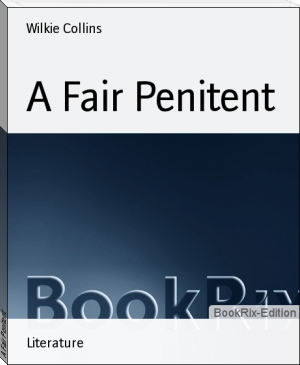Droll Stories - Volume 3 - Honoré de Balzac (good books to read for young adults TXT) 📗

- Author: Honoré de Balzac
Book online «Droll Stories - Volume 3 - Honoré de Balzac (good books to read for young adults TXT) 📗». Author Honoré de Balzac
children are formed from the father and mother, each in turn, or often from both together, because the mother mingles her qualities with the vital force of the father? Some physicians declare that they have known many children born without any resemblance to either father or mother, and attribute these mysteries to the whim of the Almighty."
"You have become very learned, my dear," replied Bastarnay; "but I, who am an ignoramus, I should fancy that a child who resembles a monk--"
"Had a monk for a father!" said Bertha, looking at him with an unflinching gaze, although ice rather than blood was coursing through her veins.
The old fellow thought he was mistaken, and cursed the servant; but he was none the less determined to make sure of the affair. As the day of Father Jehan's visit was close at hand, Bertha, whose suspicions were aroused by this speech, wrote him that it was her wish that he should not come this year, without, however, telling him her reason; then she went in search of La Fallotte at Loches, who was to give her letter to Jehan, and believed everything was safe for the present. She was all the more pleased at having written to her friend the prior, when Imbert, who, towards the time appointed for the poor monk's annual treat, had always been accustomed to take a journey into the province of Maine, where he had considerable property, remained this time at home, giving as his reason the preparations for rebellion which monseigneur Louis was then making against his father, who as everyone knows, was so cut up at this revolt that it caused his death. This reason was so good a one, that poor Bertha was quite satisfied with it, and did not trouble herself. On the regular day, however, the prior arrived as usual. Bertha seeing him, turned pale, and asked him if he had not received her message.
"What message?" said Jehan.
"Ah! we are lost then; the child, thou, and I," replied Bertha.
"Why so?" said the prior.
"I know not," said she; "but our last day has come."
She inquired of her dearly beloved son where Bastarnay was. The young man told her that his father had been sent for by a special messenger to Loches, and would not be back until evening. Thereupon Jehan wished, is spite of his mistress, to remain with her and his dear son, asserting that no harm would come of it, after the lapse of twelve years, since the birth of their boy.
The days when that adventurous night you know of was celebrated, Bertha stayed in her room with the poor monk until supper time. But on this occasion the lovers--hastened by the apprehensions of Bertha, which was shared by Jehan directly she had informed him of them--dined immediately, although the prior of Marmoustier reassured Bertha by pointing out to her the privileges of the Church, and how Bastarnay, already in bad odour at court, would be afraid to attack a dignitary of Marmoustier. When they were sitting down to table their little one happened to be playing, and in spite of the reiterated prayers of his mother, would not stop his games, since he was galloping about the courtyard on a fine Spanish barb, which Duke Charles of Burgundy had presented to Bastarnay. And because young lads like to show off, varlets make themselves bachelors at arms, and bachelors wish to play the knight, this boy was delighted at being able to show the monk what a man he was becoming; he made the horse jump like a flea in the bedclothes, and sat as steady as a trooper in the saddle.
"Let him have his way, my darling," said the monk to Bertha. "Disobedient children often become great characters."
Bertha ate sparingly, for her heart was as swollen as a sponge in water. At the first mouthful, the monk, who was a great scholar, felt in his stomach a pain, and on his palette a bitter taste of poison that caused him to suspect that the Sire de Bastarnay had given them all their quietus. Before he had made this discovery Bertha had eaten. Suddenly the monk pulled off the tablecloth and flung everything into the fireplace, telling Bertha his suspicion. Bertha thanked the Virgin that her son had been so taken up with his sport. Retaining his presence of mind, Jehan, who had not forgotten the lesson he had learned as a page, leaped into the courtyard, lifted his son from the horse, sprang across it himself, and flew across the country with such speed that you would have thought him a shooting-star if you had seen him digging the spurs into the horse's bleeding flanks, and he was at Loches in Fallotte's house in the same space of time that only the devil could have done the journey. He stated the case to her in two words, for the poison was already frying his marrow, and requested her to give him an antidote.
"Alas," said the sorceress, "had I known that it was for you I was giving this poison, I would have received in my breast the dagger's point, with which I was threatened, and would have sacrificed my poor life to save that of a man of God, and of the sweetest woman that ever blossomed on this earth; for alas! my dear friend, I have only two drops of the counter-poison that you see in this phial."
"Is there enough for her?"
"Yes, but go at once," said the old hag.
The monk came back more quickly that he went, so that the horse died under him in the courtyard. He rushed into the room where Bertha, believing her last hour to be come, was kissing her son, and writhing like a lizard in the fire, uttering no cry for herself, but for the child, left to the wrath of Bastarnay, forgetting her own agony at the thought of his cruel future.
"Take this," said the monk; "my life is saved!"
Jehan had the great courage to say these words with an unmoved face, although he felt the claws of death seizing his heart. Hardly had Bertha drunk when the prior fell dead, not, however, without kissing his son, and regarding his dear lady with an eye that changed not even after his last sigh. This sight turned her as cold as marble, and terrified her so much that she remained rigid before this dead man, stretched at her feet, pressing the hand of her child, who wept, although her own eye was as dry as the Red Sea when the Hebrews crossed it under the leadership of Baron Moses, for it seemed to her that she had sharp sand rolling under her eyelids. Pray for her, ye charitable souls, for never was woman so agonised, in divining that her lover has saved her life at the expense of his own. Aided by her son, she herself placed the monk in the middle of the bed, and stood by the side of it, praying with the boy, whom she then told that the prior was his true father. In this state she waited her evil hour, and her evil hour did not take long in coming, for towards the eleventh hour Bastarnay arrived, and was informed at the portcullis that the monk was dead, and not Madame and the child, and he saw his beautiful Spanish horse lying dead. Thereupon, seized with a furious desire to slay Bertha and the monk's bastard, he sprang up the stairs with one bound; but at the sight of the corpse, for whom his wife and her son repeated incessant litanies, having no ears for his torrent of invective, having no eyes for his writhings and threats, he had no longer the courage to perpetrate this dark deed. After the first fury of his rage had passed, he could not bring himself to it, and quitted the room like a coward and a man taken in crime, stung to the quick by those prayers continuously said for the monk. The night was passed in tears, groans, and prayers.
By an express order from Madame, her servant had been to Loches to purchase for her the attire of a young lady of quality, and for her poor child a horse and the arms of an esquire; noticing which the Sieur de Bastarnay was much astonished. He sent for Madame and the monk's son, but neither mother nor child returned any answer, but quietly put on the clothes purchased by the servant. By Madame's order this servant made up the account of her effects, arranged her clothes, purples, jewels, and diamonds, as the property of a widow is arranged when she renounces her rights. Bertha ordered even her alms-purse be included, in order that the ceremony might be perfect. The report of these preparations ran through the house, and everyone knew then that the mistress was about to leave it, a circumstance that filled every heart with sorrow, even that of a little scullion, who had only been a week in the place, but to whom Madame had already given a kind word.
Frightened at these preparations, old Bastarnay came into her chamber, and found her weeping over the body of Jehan, for the tears had come at last; but she dried them directly she perceived her husband. To his numerous questions she replied briefly by the confession of her fault, telling him how she had been duped, how the poor page had been distressed, showing him upon the corpse the mark of the poniard wound; how long he had been getting well; and how, in obedience to her, and from penitence towards God, he had entered the Church, abandoning the glorious career of a knight, putting an end to his name, which was certainly worse than death; how she, while avenging her honour, had thought that even God himself would not have refused the monk one day in the year to see the son for whom he had sacrificed everything; how, not wishing to live with a murderer, she was about to quit his house, leaving all her property behind her; because, if the honour of the Bastarnays was stained, it was not she who had brought the shame about; because in this calamity she had arranged matters as best she could; finally, she added a vow to go over mountain and valley, she and her son, until all was expiated, for she knew how to expiate all.
Having with noble mien and a pale face uttered these beautiful words, she took her child by the hand and went out in great mourning, more magnificently beautiful than was Mademoiselle Hagar on her departure from the residence of the patriarch Abraham, and so proudly, that all the servants and retainers fell on their knees as she passed along, imploring her with joined hands, like Notre Dame de la Riche. It was pitiful to see the Sieur de Bastarnay following her, ashamed, weeping, confessing himself to blame, and downcast and despairing, like a man being led to the gallows, there to be turned off.
And Bertha turned a deaf ear to everything. The desolation was so great that she found the drawbridge lowered, and hastened to quit the castle, fearing that it might be suddenly raised again; but no one had the right or the heart to do it. She sat down on the curb of the moat, in view of the whole castle, who begged her, with tears, to stay. The poor sire was standing with his hand upon the chain of the portcullis, as silent as the stone saints carved above the door. He saw Bertha order her son to shake the dust from his shoes at the end of the bridge,
"You have become very learned, my dear," replied Bastarnay; "but I, who am an ignoramus, I should fancy that a child who resembles a monk--"
"Had a monk for a father!" said Bertha, looking at him with an unflinching gaze, although ice rather than blood was coursing through her veins.
The old fellow thought he was mistaken, and cursed the servant; but he was none the less determined to make sure of the affair. As the day of Father Jehan's visit was close at hand, Bertha, whose suspicions were aroused by this speech, wrote him that it was her wish that he should not come this year, without, however, telling him her reason; then she went in search of La Fallotte at Loches, who was to give her letter to Jehan, and believed everything was safe for the present. She was all the more pleased at having written to her friend the prior, when Imbert, who, towards the time appointed for the poor monk's annual treat, had always been accustomed to take a journey into the province of Maine, where he had considerable property, remained this time at home, giving as his reason the preparations for rebellion which monseigneur Louis was then making against his father, who as everyone knows, was so cut up at this revolt that it caused his death. This reason was so good a one, that poor Bertha was quite satisfied with it, and did not trouble herself. On the regular day, however, the prior arrived as usual. Bertha seeing him, turned pale, and asked him if he had not received her message.
"What message?" said Jehan.
"Ah! we are lost then; the child, thou, and I," replied Bertha.
"Why so?" said the prior.
"I know not," said she; "but our last day has come."
She inquired of her dearly beloved son where Bastarnay was. The young man told her that his father had been sent for by a special messenger to Loches, and would not be back until evening. Thereupon Jehan wished, is spite of his mistress, to remain with her and his dear son, asserting that no harm would come of it, after the lapse of twelve years, since the birth of their boy.
The days when that adventurous night you know of was celebrated, Bertha stayed in her room with the poor monk until supper time. But on this occasion the lovers--hastened by the apprehensions of Bertha, which was shared by Jehan directly she had informed him of them--dined immediately, although the prior of Marmoustier reassured Bertha by pointing out to her the privileges of the Church, and how Bastarnay, already in bad odour at court, would be afraid to attack a dignitary of Marmoustier. When they were sitting down to table their little one happened to be playing, and in spite of the reiterated prayers of his mother, would not stop his games, since he was galloping about the courtyard on a fine Spanish barb, which Duke Charles of Burgundy had presented to Bastarnay. And because young lads like to show off, varlets make themselves bachelors at arms, and bachelors wish to play the knight, this boy was delighted at being able to show the monk what a man he was becoming; he made the horse jump like a flea in the bedclothes, and sat as steady as a trooper in the saddle.
"Let him have his way, my darling," said the monk to Bertha. "Disobedient children often become great characters."
Bertha ate sparingly, for her heart was as swollen as a sponge in water. At the first mouthful, the monk, who was a great scholar, felt in his stomach a pain, and on his palette a bitter taste of poison that caused him to suspect that the Sire de Bastarnay had given them all their quietus. Before he had made this discovery Bertha had eaten. Suddenly the monk pulled off the tablecloth and flung everything into the fireplace, telling Bertha his suspicion. Bertha thanked the Virgin that her son had been so taken up with his sport. Retaining his presence of mind, Jehan, who had not forgotten the lesson he had learned as a page, leaped into the courtyard, lifted his son from the horse, sprang across it himself, and flew across the country with such speed that you would have thought him a shooting-star if you had seen him digging the spurs into the horse's bleeding flanks, and he was at Loches in Fallotte's house in the same space of time that only the devil could have done the journey. He stated the case to her in two words, for the poison was already frying his marrow, and requested her to give him an antidote.
"Alas," said the sorceress, "had I known that it was for you I was giving this poison, I would have received in my breast the dagger's point, with which I was threatened, and would have sacrificed my poor life to save that of a man of God, and of the sweetest woman that ever blossomed on this earth; for alas! my dear friend, I have only two drops of the counter-poison that you see in this phial."
"Is there enough for her?"
"Yes, but go at once," said the old hag.
The monk came back more quickly that he went, so that the horse died under him in the courtyard. He rushed into the room where Bertha, believing her last hour to be come, was kissing her son, and writhing like a lizard in the fire, uttering no cry for herself, but for the child, left to the wrath of Bastarnay, forgetting her own agony at the thought of his cruel future.
"Take this," said the monk; "my life is saved!"
Jehan had the great courage to say these words with an unmoved face, although he felt the claws of death seizing his heart. Hardly had Bertha drunk when the prior fell dead, not, however, without kissing his son, and regarding his dear lady with an eye that changed not even after his last sigh. This sight turned her as cold as marble, and terrified her so much that she remained rigid before this dead man, stretched at her feet, pressing the hand of her child, who wept, although her own eye was as dry as the Red Sea when the Hebrews crossed it under the leadership of Baron Moses, for it seemed to her that she had sharp sand rolling under her eyelids. Pray for her, ye charitable souls, for never was woman so agonised, in divining that her lover has saved her life at the expense of his own. Aided by her son, she herself placed the monk in the middle of the bed, and stood by the side of it, praying with the boy, whom she then told that the prior was his true father. In this state she waited her evil hour, and her evil hour did not take long in coming, for towards the eleventh hour Bastarnay arrived, and was informed at the portcullis that the monk was dead, and not Madame and the child, and he saw his beautiful Spanish horse lying dead. Thereupon, seized with a furious desire to slay Bertha and the monk's bastard, he sprang up the stairs with one bound; but at the sight of the corpse, for whom his wife and her son repeated incessant litanies, having no ears for his torrent of invective, having no eyes for his writhings and threats, he had no longer the courage to perpetrate this dark deed. After the first fury of his rage had passed, he could not bring himself to it, and quitted the room like a coward and a man taken in crime, stung to the quick by those prayers continuously said for the monk. The night was passed in tears, groans, and prayers.
By an express order from Madame, her servant had been to Loches to purchase for her the attire of a young lady of quality, and for her poor child a horse and the arms of an esquire; noticing which the Sieur de Bastarnay was much astonished. He sent for Madame and the monk's son, but neither mother nor child returned any answer, but quietly put on the clothes purchased by the servant. By Madame's order this servant made up the account of her effects, arranged her clothes, purples, jewels, and diamonds, as the property of a widow is arranged when she renounces her rights. Bertha ordered even her alms-purse be included, in order that the ceremony might be perfect. The report of these preparations ran through the house, and everyone knew then that the mistress was about to leave it, a circumstance that filled every heart with sorrow, even that of a little scullion, who had only been a week in the place, but to whom Madame had already given a kind word.
Frightened at these preparations, old Bastarnay came into her chamber, and found her weeping over the body of Jehan, for the tears had come at last; but she dried them directly she perceived her husband. To his numerous questions she replied briefly by the confession of her fault, telling him how she had been duped, how the poor page had been distressed, showing him upon the corpse the mark of the poniard wound; how long he had been getting well; and how, in obedience to her, and from penitence towards God, he had entered the Church, abandoning the glorious career of a knight, putting an end to his name, which was certainly worse than death; how she, while avenging her honour, had thought that even God himself would not have refused the monk one day in the year to see the son for whom he had sacrificed everything; how, not wishing to live with a murderer, she was about to quit his house, leaving all her property behind her; because, if the honour of the Bastarnays was stained, it was not she who had brought the shame about; because in this calamity she had arranged matters as best she could; finally, she added a vow to go over mountain and valley, she and her son, until all was expiated, for she knew how to expiate all.
Having with noble mien and a pale face uttered these beautiful words, she took her child by the hand and went out in great mourning, more magnificently beautiful than was Mademoiselle Hagar on her departure from the residence of the patriarch Abraham, and so proudly, that all the servants and retainers fell on their knees as she passed along, imploring her with joined hands, like Notre Dame de la Riche. It was pitiful to see the Sieur de Bastarnay following her, ashamed, weeping, confessing himself to blame, and downcast and despairing, like a man being led to the gallows, there to be turned off.
And Bertha turned a deaf ear to everything. The desolation was so great that she found the drawbridge lowered, and hastened to quit the castle, fearing that it might be suddenly raised again; but no one had the right or the heart to do it. She sat down on the curb of the moat, in view of the whole castle, who begged her, with tears, to stay. The poor sire was standing with his hand upon the chain of the portcullis, as silent as the stone saints carved above the door. He saw Bertha order her son to shake the dust from his shoes at the end of the bridge,
Free e-book «Droll Stories - Volume 3 - Honoré de Balzac (good books to read for young adults TXT) 📗» - read online now
Similar e-books:





Comments (0)